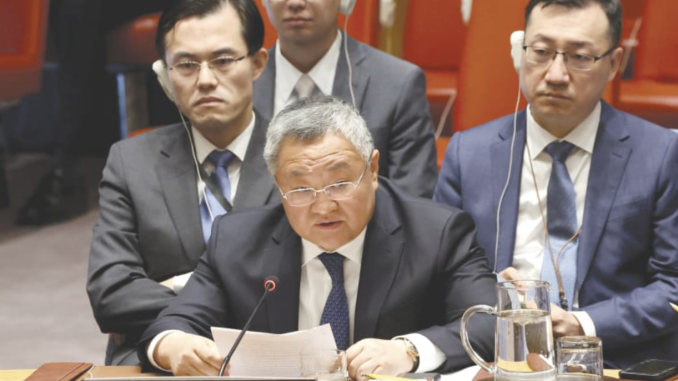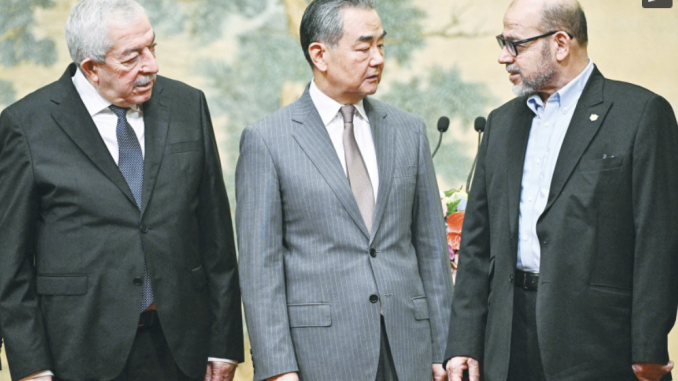Peloni: I would argue that rather than pursue an avenue of interest which would further isolate Israel from China, Israel should instead direct its attentions to the very tangible interest which China has in its connections with Iran, and that of course is their oil sales. In fact, Israel just passed an opportunity to reduce any leverage which the Iranians have over China when they failed to attack the energy sector assets in Iran which are the source of both Iran’s wherewithal to subsidize its terror proxies as well as the tie which hold China’s interests against Israel. So with a single attack, Israel could both cripple Iran’s economic infrastructure thus destabilizing the Iranian regime, while it would also serve to free China from its dependency upon Iran’s oil.
One more thing to note, is that in the follow up to the pager campaign in Lebanon, China did appear to change its rhetoric with regards to Israel. As Carice Witte, executive director of SIGNAL Group, noted at the time, “China realized Israel might win and is therefore adjusting its stance, realizing that, in order to be in the Middle East, Beijing will need some level of decent relations with Israel.” Hence, the way by which to change the balance of Chinese interests in the region would seem to be for Israel to win the war, following which Israel would be free leverage its significant economic position in the region with regards to China.
This Sino-Israeli diplomatic nadir offers an opportunity for Israel to reassess the merits of diplomatic and economic cooperation with Beijing.
By DAVID RADER & BRYCE MITCHELL | OCTOBER 26, 2024
 CHINA’S AMBASSADOR Fu Cong speaks at a UN Security Council meeting on the situation in Gaza, earlier this month. Following the horrific attacks of October 7, 2023, China – one of Israel’s most significant business and trade partners – would neither condemn Hamas’s act of terrorism nor provide any h (photo credit: BRENDAN MCDERMID/REUTERS)
CHINA’S AMBASSADOR Fu Cong speaks at a UN Security Council meeting on the situation in Gaza, earlier this month. Following the horrific attacks of October 7, 2023, China – one of Israel’s most significant business and trade partners – would neither condemn Hamas’s act of terrorism nor provide any h (photo credit: BRENDAN MCDERMID/REUTERS)
Following the horrific attacks of October 7, 2023, a bloodied and bruised Israel looked to allies and partners for compassion, support, and assistance. In one of Israel’s most vulnerable moments, many condemned the attack, some sent materials and supplies, but China – one of Israel’s most significant business and trade partners – would neither condemn Hamas’s act of terrorism nor provide any help to Israel.
While foreign policy mathematics implies that China is choosing impartiality for a variety of reasons favorable to Beijing’s broader interests, Israel has an opportunity to rebuke China’s silence on the barbaric attack as well as respond to Beijing’s diplomatic double-dealing.
To ensure the safety and continued regional primacy of Israel’s technological ecosystem, and not let this affront by Beijing be forgiven nor forgotten, Israel should significantly recalibrate its economic and business relationship with China. To do so, one of Israel’s next moves should be introducing policies or laws that increase its investment screening regime, expand protections of critical industries and technologies, and place greater scrutiny on its business relations with China.
Following the terrorist attack that ushered in the Israel-Hamas War, Sino-Israeli relations have exhibited a precipitous diplomatic and social decline. Increasingly distant are the days of Prime Minister Benjamin Netanyahu’s 2013 “Look East” policy that began years of economic and diplomatic cooperation between China and Israel.
This erosion is exacerbated by revelations that Hamas tunnels were built with the support of China’s People’s Liberation Army engineers, attackers used weapons made by Norinco (the Chinese state-owned defense corporation), China spied on military equipment shipments to Israel, and the still-deafening silence from Beijing on not condemning Hamas for its barbaric actions of last October.
 Attending an event in Beijing, last week, are (from left) Mahmoud Al-Aloul, vice chairman of the Fatah Central Committee; China’s Foreign Minister Wang Yi; and senior Hamas member Mussa Abu Marzuk. China announced that a unity deal was reached among Palestinian factions. (credit: PEDRO PARDO/POOL VIA REUTERS)
Attending an event in Beijing, last week, are (from left) Mahmoud Al-Aloul, vice chairman of the Fatah Central Committee; China’s Foreign Minister Wang Yi; and senior Hamas member Mussa Abu Marzuk. China announced that a unity deal was reached among Palestinian factions. (credit: PEDRO PARDO/POOL VIA REUTERS)
Shortly after the attacks, China’s heavily state-censored and directed social media was inundated with antisemitic content. Beijing hosted dozens of Hamas senior leaders during a summit to assert increased diplomatic influence across the region. These actions show cause for the diplomatic and political decay.
China criticizes Israel, avoids offending Hamas
Since the beginning of the war, the Chinese government has pursued a policy critical of Israel and avoids offending Hamas. Public statements from Chinese Communist Party leaders, including President Xi Jinping, have become increasingly condemnatory.
A Chinese foreign ministry official shared Beijing’s stance toward the conflict, stating “In pursuit of the right to self-determination, the Palestinian people’s use of force to resist foreign oppression and to complete the establishment of an independent state is an inalienable right well founded in international law.”
According to Chinese state media, Iran’s massive missile attack against Israel was, “an act of self-defense.” To top it off, Israel’s hi-tech industry has struggled to import vital dual-use components from China. In sum, China has revealed itself to be a very fickle and callous partner.
CHINA’S AMBIVALENCE toward Hamas is having a clear negative impact on Israeli public opinion toward Beijing. Domestic media and polling show that some Israelis are souring toward China. According to the Institute for National Security Studies, 54% of the Israeli public considers China to be unfriendly or hostile to Israel.
Prior to the war, Pew research found that the majority of Israelis viewed China favorably. Senior officials in the Israeli parliament have spoken out about China and local Israeli media outlets have begun featuring discussions of whether Chinese capital investment is a security threat.
Prior to the invasion, Israel managed to stay on the sidelines of the strategic competition between the United States and China and enjoyed benefits from both nations – stronger economic ties and capital from Beijing and arms support from Washington.
The wars at Israel’s borders should be managed within the great power framework of the modern Middle East, where Chinese ambitions abound. In the 21st century, Israel has become one of the world’s foremost technological innovation hubs – colloquially referred to as “Startup Nation.” Through risk-taking talent, powerful public-private partnerships, and ample private capital, Israel’s approximately 9,000 tech startups generate 18% of GDP and have become a valuable and globally impactful portion of the Israeli economy.
It is a title earned by decades of hard work and is not only a mark of national pride but something Israel needs to work desperately to both protect and grow.
There are high levels of technological cooperation between the US and Israel. The Departments of Homeland Security, Agriculture, State, and Defense, and various private organizations, all work with Israeli counterparts to collaborate on artificial intelligence, food and water security, autonomous systems, energy platforms, biotechnology, and other critical technologies. These pursuits serve as one of the many pillars of the strong partnership between the US and Israel.
However, American government officials have always been concerned that these technologies may be wittingly or unwittingly transferred to a nefarious actor or malign government – specifically China. These concerns were especially high during Israel’s more friendly years with America’s now-leading adversary but will remain elevated until Israel officially modernizes its policies or laws to better protect critical technologies and industries, screen foreign investments, and deny China as much access or influence into Israel.
This Sino-Israeli diplomatic nadir offers an opportunity for Israel to reassess the merits of diplomatic and economic cooperation with Beijing. The war has revealed China’s true perspective on Israel and its agenda for the Middle East. Within the Israeli government, this revelation warrants a serious internal review of Jerusalem’s policies toward China. Israel should address ways to further scrutinize Chinese foreign direct investment into the Startup Nation.
Although Israel’s past steps to remove Chinese capital influence from domestic infrastructure projects are commendable, there is much more work to be done to further limit Chinese investments into its many critical technologies.
The time is right for Israel to seriously question the true nature of Beijing’s Middle East agenda. If leaders in Israel choose to respond to China’s deplorable actions, it will signal that terrorism may have just begun playing a bigger role in economic statecraft.
David Rader is a former deputy director of Global Investment & Economic Security at the US Defense Department and a senior fellow at the Foundation for Defense of Democracies. Bryce Mitchell is an Air Force reserve intelligence officer and president of Stanford University’s Technology and National Security Network.



Leave a Reply
You must be logged in to post a comment.